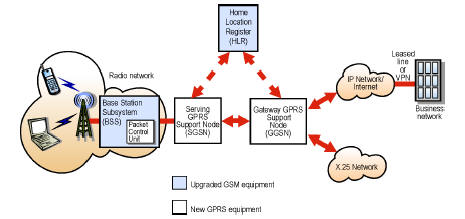|

The General Packet Radio Service (GPRS)
is a new non-voice value added service
that allows Mobile Phones to be used for
sending and receiving data over an Internet
Protocol (IP)-based network. GPRS as such
is a data bearer that enables wireless
access to data networks like the Internet,
enabling users to access E-mail and other
Internet applications using Mobile Phones.
With GPRS you can enjoy a continuous
wireless connection to data networks (Internet)
and access your favorite web sites, entertainment
services and other web applications.
GPRS is packet based, wherein GPRS data
is handled as a series of "packets"
that can be routed over several paths
through the network, rather than as a
continuous bit-stream over a dedicated
dial-up connection. With GPRS, the information
is split into separate but related "packets"
before being transmitted and reassembled
at the receiving end. The Internet itself
is an example of a packet data network,
the most famous of many such network types.
In second-generation mobile networks,
calls are handled using traditional circuit-switching
technology. A dedicated "circuit",
or "timeslot", is allocated
between two points for the duration of
a call. No other phone can use this circuit
during the call, regardless of whether
any data is being transmitted or not.
GPRS standard is delivered in a very
elegant manner- with network operators
needing only to add a couple of new infrastructure
nodes and making a software upgrade to
some existing GSM network elements.
Internet on
the Mobile: For the first time,
GPRS fully enables Mobile Internet functionality
by allowing interworking between the existing
Internet and the new GPRS network. Any
service that is used over the fixed Internet
today- File Transfer Protocol (FTP), web
browsing, chat, email, telnet- will be
as available over the mobile network because
of GPRS. Because it uses the same protocols,
the GPRS network can be viewed as a sub-network
of the Internet with GPRS capable mobile
phones being viewed as mobile hosts. This
means that each GPRS terminal can potentially
have its own IP address and will be addressable
as such.
Rich Media Applications:
GPRS facilitates several new applications
that have not previously been available
over GSM networks due to the limitations
in speed of Circuit Switched Data and
message length of the Short Message Service
(160 characters). GPRS will fully enable
the Internet applications you are used
to on your desktop from web browsing to
chat over the mobile network. Other new
applications for GPRS, profiled later,
include file transfer and home automation-
the ability to remotely access and control
in-house appliances and machines.
Speed:
GPRS allows large amounts of data to be
sent over mobile networks at speeds three
to four times greater than conventional
GSM systems. Theoretical maximum speeds
of up to 171.2 kilobits per second (kbps)
are achievable with GPRS using all eight
timeslots at the same time. This is about
three to four times as fast as the data
transmission speeds possible over today's
fixed telecommunications networks and
ten times as fast as current Circuit Switched
Data services on GSM networks.
Always On:
GPRS facilitates instant connections whereby
information can be sent or received immediately
as the need arises, subject to radio coverage.
No dial-up modem connection is necessary.
This is why GPRS users are sometimes referred
to be as being "always connected".
Immediacy is one of the advantages of
GPRS (and SMS) when compared to Circuit
Switched Data. High immediacy is a very
important feature for time critical applications
such as remote credit card authorization
where it would be unacceptable to keep
the customer waiting for even thirty extra
seconds.
|